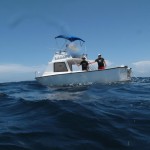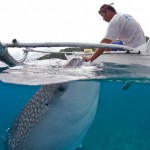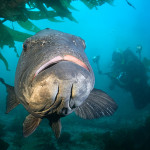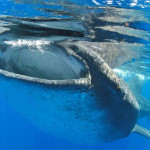If you have been following the story of Andrea Marshall and the manta rays off Mozambique you may notice she responded to questions in the comments section yesterday to tell us she’s working with elasmobranch expert Leonard Compagno to sort through “10 generic and 25 species synonyms, mostly without type specimens” in order to figure out whether she has a new species (or two).
Ocean Revolution co-director Tim Dykstra contacted Deep Sea News, too, thanking us for highlighting the outreach and communication model the Whale Shark and Manta Research Centre has embarked upon. I called the science communication model “Science 2.0”, but barely touched upon the most important aspect of their program, community outreach.
Here’s a few pictures of what community engagement looks like in Mozambique. Most of these people are seeing whale sharks and manta rays alive for the first time. They are learning about sustainable ecotourism as an economic alternative to commercial fishing (for manta rays).

Maunza villagers listening to Bitonga Divers presentation. Photo by Jon Snow.

Carlos Macua and Anabela Muchanga present a conservation talk in the fishing village Jobene Mozambique. Photo by Jon Snow.
During this visit the Bitonga Divers/Manta and Whale Shark Research Centre/Ocean Revolution team, with their Kangela generator, Mac computer and multimedia projector gave presentations in Jobene and Maunza, two fishing villages without electricity, water or schools located at the sites of major Manta/Whale Shark/reef habitat.
Bitonga Divers presented the Powerpoints of the Manta and Whale Shark Research Centre in Bitongan and Xistwa, conducted quiz shows on the material with Bitonga Divers t-shirts as prizes, held open microphone sessions addressing environmental and economic concerns and brought an unprecedented informational source into these remote communities. There is now a schedule of coastal villages and schools to be visited in the future.
Community outreach is the first step towards community involvement. It leads to capacity building, which then becomes stewardship. The communities are learning they have a choice between fishing for these big animals, or learning how to care for them. The latter will draw tourists for many years, while the former will not.
Methinks a Donor’s Choose operation would go a looong way in Mozambique, my friends. Our gifts would be golden in these communities, helping to secure a sustainable future for the manta rays and the whale sharks now fished for the Asian market. I’ll have to check with the boss on that one, but in the meantime, please let us know in the comments if you’d be willing to support that.






Peter, thanks so much for posting both of these entries…
that is the type of overall active research + communication + outreach program (with conservation), I would love to be a part of. I would suport it in a heartbeat.
Absolutely!
Count me in!